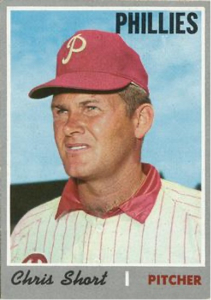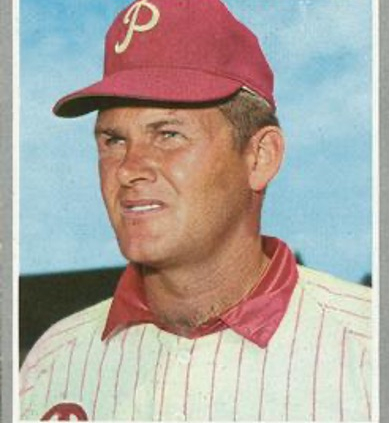September 29, 1970: Phils stumble in Connie Mack Stadium’s waning days
“Connie Mack Stadium is an old woman dancing nude at the Medicare Senior Prom. You know what she might once have been, but tonight she is an obscene accordion of yellowed flesh. … Connie Mack Stadium is the lengthened shadow of a man, sliding finally to rest. A small step for any other city, a giant step for Philadelphia.”1
 Bill Conlin of the Philadelphia Daily News went on at length in a caustic vein in the edition of October 1, 1970, the day the Phillies played the final game at Connie Mack Stadium. However wince-inducing Conlin’s words may be, they capture a certain atmosphere … the aura of a fan-scorned, time-scarred ballpark in a run-down neighborhood, with yet another disappointing home team playing out the string.
Bill Conlin of the Philadelphia Daily News went on at length in a caustic vein in the edition of October 1, 1970, the day the Phillies played the final game at Connie Mack Stadium. However wince-inducing Conlin’s words may be, they capture a certain atmosphere … the aura of a fan-scorned, time-scarred ballpark in a run-down neighborhood, with yet another disappointing home team playing out the string.
The first night of the forsaken park’s final homestand in eight decades of service, Tuesday, September 29, 1970, exemplified the when-will-this-be-over vibe of Conlin’s column. A listed crowd of 1,055 fans – one reporter suggested that the figure was generous2 – turned out on a cold night to see the fledgling Montreal Expos spank the Phillies, 10-3. It was the park’s lowest turnout since 1954,3 when 936 fans attended a late-September game between the Phillies and Pittsburgh Pirates. The Expos-Phillies game attracted roughly one fan for every 32 seats.4
Phillies fans had been swallowing a familiar diet of frustration throughout the season. Manager Frank Lucchesi’s team entered the game in fifth place in the six-team National League East Division with a 72-86 record, 14½ games behind the first-place Pirates.
The Phillies and their fans got an extra dose of bad news on the day of the game, when promising outfielder Joe Lis failed a second electrocardiogram test and was ordered to skip the final series against Montreal, as well as a planned season in winter ball.5 Lis had led the Pacific Coast League with 36 home runs, and hit .189 in 13 games for Philadelphia in his first taste of big-league ball. Lis received the all-clear from doctors in December6 and went on to play eight seasons in the majors. But on September 29, his athletic future was in doubt.
Gene Mauch’s Expos trailed the Phillies by 1½ games, with a 71-88 record. This represented significant improvement for the second-year franchise, which went 52-110 the previous season. Mauch predicted “70 wins in ’70” before the season started, and the Expos reached that goal against St. Louis a few days before coming to Philadelphia.7 The 1970 Expos closed the season with 73 wins, including 11 against the Phillies – their highest victory total against any team.
Mauch gave the start on the mound to second-year right-hander Steve Renko, who entered the game with a 12-11 record and a 4.37 ERA. He’d started against the Phillies three times, winning two and losing one, turning in a complete-game three-hitter in an 8-1 win on June 30. Stalwart lefty Chris Short started for Philadelphia, with a 9-15 record and a 4.16 ERA. Short had pitched for the Phillies since 1959, and this was his 203rd and final pitching appearance at Connie Mack Stadium. Coming into the game, Short had a lifetime 68-56 record at the ballpark at 21st and Lehigh Streets. He’d thrown 48 complete games and 10 shutouts there.
It briefly looked as if the Phillies might send him off in style. With two out in the first inning, left fielder Ron Stone drew a walk, then moved to second on a wild pickoff attempt by Renko. A single to left field by first baseman Deron Johnson gave the home team a quick 1-0 lead.
Short gave the lead back the following inning. With one out, catcher John Bateman and shortstop Bobby Wine hit back-to-back singles. Short struck out first baseman Ron Fairly, bringing ninth-place hitter Renko to the plate. By pitchers’ standards, Renko was a fairly accomplished hitter, hitting .200 in 1970 and .215 over the course of his career. Renko ripped his third double of the season to right field to put the Expos on top, 2-1.
The home team wasted an opportunity in the bottom of the second. Right fielder Oscar Gamble hit an apparent double to left-center field but was called out on appeal for missing first base. The play was scored as an 8-6-3 out, from center fielder Don Hahn to shortstop Wine to first baseman Fairly.
The Expos ended Short’s day in the third inning. Second baseman Gary Sutherland led off with a single and right fielder Rusty Staub sacrificed. Left fielder Bob Bailey singled in Sutherland, then took second on an error by Stone. Third baseman Coco Laboy reached when Phillies third baseman Don Money misplayed his grounder, with Bailey moving to third. Bateman doubled in Bailey and Laboy for a 5-1 Montreal lead. Reliever Bill Champion got Wine to pop to third. Renko followed with his second hit of the day, a single to right, but Gamble threw out Bateman trying to score.
The Phillies regained some of the lost ground in the bottom of the third on singles by second baseman Tony Taylor and Stone, followed by a two-run double by Johnson to deep center field8 that made the score 5-3, Montreal. After that, the pitchers found a rhythm. The fourth inning through the sixth passed quietly, with each team moving a single runner to second base but not scoring him. Phillies center fielder Scott Reid ended the sixth with a strikeout, his second of the game. It was the final at-bat of Reid’s two-season, 38-game major-league career, as Gamble moved to center to replace him the following inning.9
Montreal stung Champion for two more runs in the seventh. Sutherland walked, moved to second on a wild pitch, and scored on a double by Staub. Bailey singled to center to score Staub and make it 7-3, but was cut down trying to take second on the throw. Reliever Fred Wenz came in and got the final two outs.
The pitcher they called Fireball Fred landed in a jam in the eighth, loading the bases with one out on an error, a wild pitch, a walk, and a hit batsman. (The hit batsman was opposing pitcher Mike Marshall, who entered in the seventh after Renko aggravated a nerve in his hip.)10 Wenz rallied against the top of the Expos’ lineup, retiring replacement center fielder Boots Day, Sutherland, and Staub to escape the inning. It was the last of 31 major-league appearances for Wenz over a three-year career. Fed up with low pay, travel, and front-office politics, he retired after the season and went full-time into the liquor distribution business.11
One can only wonder how many of the announced 1,055 fans were still present at the start of the ninth, with the home team trailing 7-3. Bill Laxton – born across the Delaware River in Camden, New Jersey – came in to pitch for the Phillies. He’d pitched in only one previous big-league game, throwing a shutout inning in a lopsided loss to Pittsburgh on September 15.
The Expos greeted him like a gang of muggers. Bailey homered, Laboy walked, and Bateman homered to push the Expos’ lead to 10-3. Laxton retired Wine and Fairly, then walked Marshall – the second time the reliever reached base without a hit. A strikeout by Day finally ended the Montreal rally.
The most the Phillies could muster in the ninth was a one-out single by rookie shortstop Larry Bowa. Marshall retired Taylor on a line drive to center and Stone on a pop to second to end the game in 2 hours and 49 minutes. Renko got the win, Short took the loss, and Marshall earned his second save. It was the Expos’ seventh straight win against Philadelphia.
The Philadelphia Inquirer labeled the game a “disaster,” calling Short’s outing “discouraging.”12 Short pitched two more seasons for the Phillies and one for the Milwaukee Brewers but was never again a big winner, posting a record of 11-20 over that period.
The Phillies drew only 1,186 fans the next night, as Bill Stoneman beat Rick Wise to put the Expos a half-game ahead of Philadelphia. The season, and Connie Mack Stadium’s 62-season lifespan, ended October 1 as the Phillies knocked off the Expos in 10 innings, 2-1, to push Montreal back into last place. The final opportunity to say goodbye to the ballpark drew 31,822 fans – some of whom looted the park for chairs, signs, sod, and other items, forcing the cancellation of postgame ceremonies.13 The team moved into brand-new Veterans Stadium the following year, and by 1976, Philadelphians’ long-steeping frustration over watching (mostly) noncompetitive baseball in outmoded facilities had been replaced by a bright new future that climaxed with a World Series title in 1980.
Acknowledgments
This article was fact-checked by Stew Thornley and copy-edited by Len Levin.
Sources and photo credit
In addition to the specific sources cited in the Notes, the author used the Baseball-Reference.com and Retrosheet.org websites for general player, team and season data and the box scores for this game.
https://www.baseball-reference.com/boxes/PHI/PHI197009290.shtml
https://www.retrosheet.org/boxesetc/1970/B09290PHI1970.htm
Image of 1970 Topps card #270 downloaded from the Trading Card Database.
Notes
1 Bill Conlin, “… A Shadow, Finally Sliding to Rest,” Philadelphia Daily News, October 1, 1970: 68.
2 Marv Moss, “Expos Power Blasts Phils,” Montreal Gazette, September 30, 1970: 63.
3 Bill Conlin, “Expos, Lis News Spoil Phils’ Bliss,” Philadelphia Daily News, September 30, 1970: 56.
4 Based on a capacity of about 33,000.
5 Conlin, “Expos, Lis News Spoil Phils’ Bliss”; “Phils’ Lis Has Heart Condition,” Philadelphia Inquirer, September 30, 1970: 31.
6 Bob Hurte, “Joe Lis,” SABR Biography Project, accessed online July 25, 2021.
7 Norm King, “September 25, 1970: Mauch’s 70 in ’70 Prediction Comes True,” SABR Games Project, accessed online July 25, 2021.
8 Allen Lewis, “Expos KO Short, Jar Phils in Battle for Cellar, 10-3,” Philadelphia Inquirer, September 30, 1970: 31.
9 In 68 major-league at-bats, Reid struck out 27 times.
10 Moss.
11 Bill Nowlin, “Fred Wenz,” SABR Biography Project, accessed online July 25, 2021. Wenz subsequently became successful selling portable storage sheds.
12 Lewis.
13 James Lincoln Ray, “Shibe Park/Connie Mack Stadium,” SABR Biography Project, accessed online July 25, 2021.
Additional Stats
Montreal Expos 10
Philadelphia Phillies 3
Connie Mack Stadium
Philadelphia, PA
Box Score + PBP:
Corrections? Additions?
If you can help us improve this game story, contact us.


